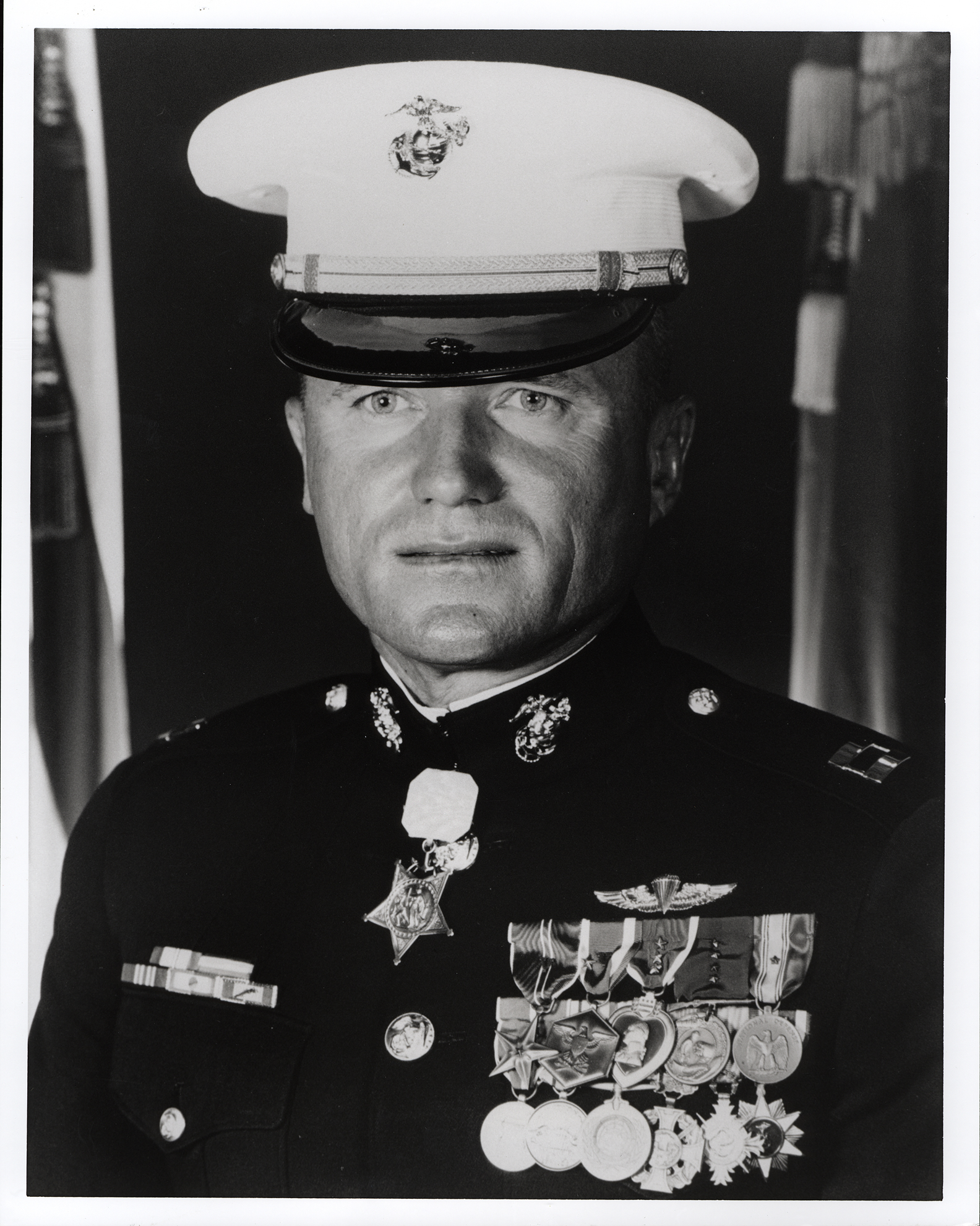
COLONEL
WESLEY LEE FOX, USMC (RETIRED)
Medal of Honor Citation
Colonel Wesley L. Fox was the 48th Marine to be awarded the Medal of Honor for outstanding heroism, while serving as Company Officer of Company A, 1st Battalion, 9th Marines, 3d Marine Division, in action against the enemy in the Republic of Vietnam, on 22 February 1969. The Medal was presented to then-Captain Fox by President Nixon during a joint service ceremony held at the White House on 2 March 1971.
Born 30 September 1931, in Herndon, Virginia, Wesley Lee Fox attended Warren County High School in Front Royal, Virginia, until 1948. His schooling since entering the Marine Corps included the Airborne School, Fort Benning, Georgia, 1961; the Underwater Swimming School at Subic Bay, Philippine Islands, 1962; the Military Assistance Training Advisors Course at the JFK Warfare Center, Fort Bragg, North Carolina, 1967; and the Amphibious Warfare School, Marine Corps Base, Quantico, Virginia, 1970.
Enlisting in the Marine Corps on 4 August 1950, he was ordered to the Marine Corps Recruit Depot at Parris Island, South Carolina, for his recruit training which he completed in October 1950.
After a brief tour as a rifleman with the 2d Marine Division at Marine Corps Base, Camp Lejeune, North Carolina, he next served his initial tour during the Korean conflict as a rifleman with Company I, 3d Battalion, 5th Marines, 1st Marine Division. Wounded in action on 8 September 1951, he was evacuated to the U.S. Naval Hospital, National Naval Medical Center, Bethesda, Maryland.
Upon his release from Bethesda in March 1952, he served with the Armed Forces Police, in Washington, D.C., as a patrolman until September 1953 when he was reassigned to Marine Aircraft Group 11 in Japan.
Returning to Korea for his second tour, Sgt Fox served as a platoon sergeant with Company G, 3d Battalion, 5th Marines and, upon returning to the United States, he served briefly at the Marine Corps Base, Camp Pendleton, California, prior to being assigned to Drill Instructors School at the Marine Corps Recruit Depot, San Diego, California.
Completing his course of instruction in August 1955, he remained at San Diego serving as a drill instructor until August 1957 when he once again returned to the East Coast to attend Recruiter’s School at the Marine Corps Recruit Depot, Parris Island, South Carolina, subsequent to being assigned duty as a recruiter in the Washington, D.C., and the Baltimore, Maryland areas.
After completing his tour as a recruiter in December 1960, he was ordered back to the West Coast and served as a platoon sergeant with the 1st Force Reconnaissance Company at both Camp Pendleton, California, and on Okinawa through November 1962. In December 1962, he was assigned as a troop handler at the Marine Air Detachment, in Jacksonville, Florida, and served in this capacity until September 1965.
Gunnery Sergeant Fox next saw duty in the Office of the Provost Marshall, Supreme Headquarters Allied Powers Europe (SHAPE) in Paris, France. In May of 1966, he was promoted to first sergeant and also commissioned as a second lieutenant. Returning to the United States in August of that year, he became a platoon commander with the 2d Force Reconnaissance Company at Camp Lejeune, North Carolina.
Lieutenant Fox was ordered to the Republic of Vietnam where he served as a battalion advisor to the Vietnamese Marine Corps for thirteen months. Being reassigned in November 1968, he became the Commanding Officer of Company A, 1st Battalion, 9th Marines, 3d Marine Division, serving in this capacity until May 1969. It was during this assignment that he earned the Nation’s highest decoration for bravery. He was promoted to captain, 1 April 1969.
Upon his return to the United States, he completed the Amphibious Warfare School, Marine Corps Base, Quantico, Virginia, in January 1970, at which time he assumed his assignment as a tactics instructor, The Basic School, Quantico. After 43 years of Marine Corps service, he retired at the rank of colonel in September 1993.
In addition to the Medal of Honor, his medals and decorations include: the Bronze Star Medal with Combat “V”, the Navy Commendation Medal with one Gold Star, the Purple Heart with three Gold Stars in lieu of second through fourth awards, the Combat Action Ribbon, the Presidential Unit Citation, the Good Conduct Medal with four Gold Stars in lieu of subsequent awards, the National Defense Service Medal with one Bronze star, the Korean Service Medal with three Bronze Stars, the United Nations Service Medal, the Vietnam Service Medal with one Silver Star and one Bronze Star in lieu of subsequent awards, two Vietnamese Crosses of Gallantry, the Vietnamese Honor Medal 1st Class, the Vietnamese Unit Cross of Gallantry with Palm, the Korean Presidential Unit Citation, and the Republic of Vietnam Campaign Medal.
Vietnam War 1963-1975 Medal of Honor